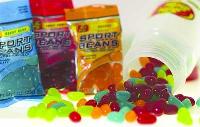Confectioners Cater to Health-Conscious Consumers
By Amanda Janis/Business Editor
TheReporter.Com

Developed for the Jelly Belly Cycling Team as an alternative to nutrition bars, the sport beans are now being marketed to aid workouts. (Joel Rosenbaum/The Reporter)
A kid in a candy store has a lot more options these days. And some of those options may have parents, dentists, and coaches nodding their approval, as confectioners throughout the country capitalize on one of the biggest food industry trends: Healthier products.
"As a broad marketer and a leading company, we need to be consistent with all the major consumer trends," said Lance Jensen, vice president of marketing for Fairfield-based Jelly Belly Candy Company. "It's all about keeping your brand relevant."
That's important for an industry that, according to the U.S Census Bureau, has seen a slight decline in candy consumption during the past few years. In 1997, the average American devoured more than 27 pounds of candy per year; in 2004, Americans consumed 24.7 pounds per capita.
And while the candy industry has an admittedly fun, playful air about it, it's not all Everlasting Gobstoppers and lickable wallpaper - it's big business. More than $28 billion in various types of candies were sold in the U.S. in 2005, according to the National Confectioners Association.
Jelly Belly's Jensen explained that candy companies have three basic options for creating products that fall under the "healthy halo" while maintaining fabulous flavor - highlight the healthful benefits in existing products, like the antioxidants found in dark chocolate; remove something from the products, such as refined sugar; or add something nutritional, like vitamins.
Jelly Belly does it all, with well-established product lines, including dark chocolate-covered nuts and sugar-free candies, as well as new products that fit the latter category.
Its newest "health-added" product, Jelly Belly Fruit Snacks, just hit select Costco stores last month.
"It's 33 percent fruit juice-based," Jensen said. "Sugar is in the product, but it's also made with seven fruit juices and (contains) 25 percent of Vitamin C (recommended daily allowance)."
The colorful gummy fruit snacks, which are a joint effort with Costco and its Kirkland Signature brand, could be developed for sale in traditional stores and markets, though there's no current plan to do so, Jensen said.
Incorporating fruit juice into candy - in some cases entirely replacing refined sugar - is a trend among domestic candy makers, like Atlanta, Ga.-based Innovative Candy Concepts.
Its president and chief executive realized the need for such products after watching his grandchildren eat his company's Too Tarts candy, reported Columbia News Service's Lauren Mack.
"They were basically eating pure sugar," Hammer told Mack. So he had refined sugar removed from the company's recipes, calling the revamped candies Too Tarts SmartChoice. His business grew as a result.
"It's the best thing we've ever done," he told Mack. "It's a healthier, smarter choice; it's not broccoli."
Another hot, new product that falls under the "healthy halo," Jelly Belly's Jensen said, is the Fairfield company's Sport Beans.
"This is more of an example of an energy product that takes the shape of a jelly bean," he explained. "We don't consider this a candy, we consider this an energy product."
Sport Beans - like sport drinks, bars and gels - are designed to provide a power boost before or during prolonged periods of exercise. One package of Sport Beans, which were developed with help from "key Ph.D.s" at the University of California, Davis, contains 25 grams of carbohydrates, as well as electrolytes and vitamins B1, B2, B3 and C.
"They actually got the idea to make a sport drink in a bean form from their cycling team," recalled Dr. Liv Applegate, director of sports nutrition at U.C. Davis. "They fiddled around with formulations and then gave me a call, asked me what I thought of it, and so we worked together on that about a year ago."
While the idea originated with the company's cycling team, Jensen said, "the more we developed and learned about it, we realized there are a lot of people out there (for whom) this product can fill a niche. It's a great product because it tastes great and it works."
Applegate applauds the company for taking a product already being used by athletes and making it more functional and tailored to such use.
"For years and years I've recommended that cyclists, runners and triathletes take jelly beans with them," she said, "because they can pop them in their mouth while running and it's a great source of carbohydrates."
She also praises the company for going the extra mile in product research; Jelly Belly is currently supporting a study at Davis that tests a sport drink, carb gel and Sport Beans against water. Results should be available in September or October, Applegate said, and will be presented at the American College of Sports Medicine.
Amanda Janis can be reached at business@thereporter.com.
